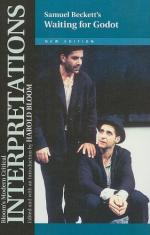|
This section contains 13,724 words (approx. 46 pages at 300 words per page) |

|
SOURCE: Katz, Daniel. “‘Ways of Being We’: The Subject as Method, Method as Ritual in Watt.” In Saying I No More: Subjectivity and Consciousness in the Prose of Samuel Beckett, pp. 43-70. Evanston, Ill.: Northwestern University Press, 1999.
In the following essay, Katz studies Watt as a transition between Beckett's life in Ireland and England and his move to France as well as between his early conventionally composed works and his later experimental writing.
Beckett's mystifying second novel, Watt, seems to have generated two main lines of critical approach. One influential trend points to the mock-Cartesian elements of the novel and reads it as a critique of rationalist epistemological pretensions regarding both hermeneutics and problem solving. As Thomas Cousineau writes, “Critics have tended to treat Watt as an allegory in which human beings' rationalistic pretensions are ridiculed.”1 Many critics have pointed out, for example, that Watt's absurd speculations concerning...
|
This section contains 13,724 words (approx. 46 pages at 300 words per page) |

|


